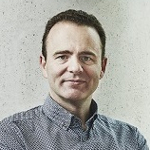News for the Foresight Community
- Hot Topic: Secretary of the Future?
- Relaunches: World Future Society, Communities of the Future
- Blog Report: $100 Trillion Toilet Paper
- Mack Report: More Services, Fewer Jobs?
Hot Topic: Secretary of the Future?
Recently on American Public Media’s Marketplace, David Brancaccio and Katie Long picked up on the late Kurt Vonnegut’s what-if scenario of a cabinet-level futurist. Vonnegut had fretted, “I'll tell you ... one thing that no Cabinet has ever had is a Secretary of the Future, and there are no plans at all for my grandchildren and my great grandchildren.”

The idea, Brancaccio and Long infer, is “to help politicians think harder about how today’s actions might play out in 10, 20, 50 years.” This is a well-established activity in many corporations, such as Intel, where former futurist-in-residence Brian David Johnson’s role included presenting to the decision makers “a future that really wasn’t quite rosy because the company needed to be prepared for that.”
Taking issue with such a proposal is Reason magazine’s science columnist (with solid futurist credentials of his own), Ronald Bailey: “My quick answer,” he writes, “It's a really stupid idea. Human beings are terrible at foresight, and it would be especially terrible to try [to] marry our purblind premonitions to government power.”
Bailey provides an overview of the U.S. government’s predictive failures since the 1970s, suggesting that, unlike businesses, government forecasters bear no real consequences for getting things wrong: “But if a private company gets its forecasts wrong, the worst that happens is that it goes out of business and is replaced by competitors who made the right calls. Markets are superb at marshaling vast quantities of information, and they amply reward foresight and good guesses,” Bailey writes. “The problem with government planning is government power.”
Returning to the idea of a Secretary of the Future, however, let’s look at another possibility: that foresight in government would not be about power or prediction, but about ongoing cross-agency and cross-sector discussions of possible futures and their consequences. This was the basis for such foresight-oriented government entities as the Congressional Office of Technology Assessment, the Congressional Clearinghouse on the Future, and then-Senator Al Gore Jr.’s 1990 proposal for a White House-based office to study critical trends. (“The Critical Trends Assessment Act: Futurizing the United States Government,” The Futurist, March-April 1990.)
Former Gore adviser Leon Fuerth outlined such a scenario of ongoing futures discussions in a 2013 article for The Futurist. Fuerth and co-author Evan Faber described ways for government workers below the cabinet level and across agencies to confer and inform each other on emerging trends and their potential consequences—thus fulfilling the goal of helping “politicians think harder about how today’s actions might play out in 10, 20, 50 years.”
Comment: Shortly after his inauguration, President George W. Bush spoke at a trade association dinner I attended. During the meet-and-greet, I was able to blurt out a challenge to the new president: “We’d like to see more foresight in government!” He responded, without irony: “So would I. It would be a miracle.” —CGW
Sources: David Brancaccio and Katie Long, “What If We Had a Secretary of the Future?” Marketplace, posted March 1, 2016. Ronald Bailey, “A U.S. Department of the Future Is a Really Bad Idea,” Reason, posted March 18, 2016.
Reference: Leon Fuerth and Evan Faber, “Anticipatory Governance: Winning the Future,” The Futurist, July-August 2013. PDF available on request.
Signals: foresight, futurists, government
Relaunches: World Future Society, Communities of the Future
Two venerable futures organizations have recently relaunched themselves, with new missions and new websites:
* World Future Society, http://www.wfs.org, founded in 1966 by Edward Cornish, invites futurists to “Be a part of our ambitious and exciting plans as we build a community of future-focused leaders who connect across the globe and explore areas of shared interest.” The Society's annual conference this year, themed “A Brighter Future IS Possible,” will serve as a 50th anniversary summit on the organization's future. (Signal courtesy of Jerome C. Glenn.)

* Communities of the Future, http://communitiesofthefuture.org/, founded in 1989 by Rick Smyre, unites futurists at the local level to share visions and resources to actively manage the multifaced changes affecting their communities. As Smyre steps away from being the central driver of COTF's activities, he invites friends and colleagues to participate in building COTF 2.0. (Signal courtesy of Peter Bishop.)

Blog Report: $100 Trillion Toilet Paper
In January 2009, Zimbabwe issued its largest-denomination bank note, a one-hundred-trillion-dollar bill. Soon after, it was not enough to buy a single square of bathroom tissue.
The hyperinflation Zimbabwe was experiencing is an example of a wild card—a low probability, high impact event or condition. Unfortunately, writes environmental futurist David N. Bengston, traditional planning typically focuses on continuous change rather than on potentially life-altering events. In the case of Zimbabwe's hyperinflation, life savings were wiped out, real assets were hoarded, and foreign investment evaporated.
“On the plus side,” Bengston notes, “hyperinflation is good for people who are in debt because they can pay it off with worthless cash. But a complete breakdown of the economy is a steep price to pay for clearing your debt!”
Read: “The Strange Case of the Hundred Trillion Dollar Toilet Paper” by David N. Bengston, Foresight Signals Blog, posted April 1, 2016.
Signals: economics, inflation, wild cards, Zimbabwe
More Services, Fewer Jobs? AI and Automation's Impacts
By Timothy C. Mack
Research and development in artifical intelligence and automation may focus on solving human problems or on developing machine learning; both focuses have potential impacts on creating or eliminating jobs.
On issues of agency, the researchers ask what problems need to be solved and how can AI or robotics solve them. For example, in the delivery of health services, how do you reach remote locations where costs are too high for the lowest income populations? Perhaps digital response and assessment can save lives where human doctors are not available or practical. Similarly, in elementary school settings with insufficient availability of human teachers, could a responsive program serve to tutor struggling students in a personalized way? In these examples, the digital agency is shaped so that the AI function is specific-task oriented.




The other side of this coin is the focus on machine learning, such as by the Google DeepMind project. Its most recent deep learning approaches are self-structured—that is, they are not preprogrammed. The 2015 Deep Q project let a reinforcement-learning program teach itself how to play older Atari video games, with the result that it not only learned very quickly but it surpassed the game creators in developing unique strategies. In this setting, the agency was intentionally independent and somewhat unbounded (except for the focus on video games). Accordingly, the focus is expansion of AI learning capability (general intelligence).
So the question becomes how these two paths will affect the course of work worldwide in the future. And the clear answer is the old saw, “It’s complicated.” This means that outcomes will be shaped by the dialogues between these viewpoints: targeted problem solving and general capacity building. The spread between these viewpoints is driven not so much by Luddite fears of job replacement by the grandchild of automation in some form of thinking versus acting, but instead by more elemental fears of species replacement with AI as the next and better generation (whether it be augmented humans or digital avatars). It is very likely that both concerns about unbounded AI independence and the drive for efficiency and effectiveness will produce a mix of outcomes as we move forward.
Not only will AI continue to replace humans in many areas, but we will also see digital agents of all sorts assisting humans in areas such as law, medicine, journalism, and so on to improve outcomes. Medical services to groups and regions not served before, reductions in traffic fatalities from assisted-driving software, and better legal representation in an always high-stress field are among many examples ahead.
How we'll manage the cultural and policy impacts is more a political and social question than a technical one, but the policy issues are making themselves felt through the AI R&D world as well. The result, as it plays out, will be fascinating.
Timothy C. Mack is managing principal of AAI Foresight Inc.
Signals: AI, artificial intelligence, automation, education, jobs, work

